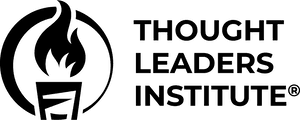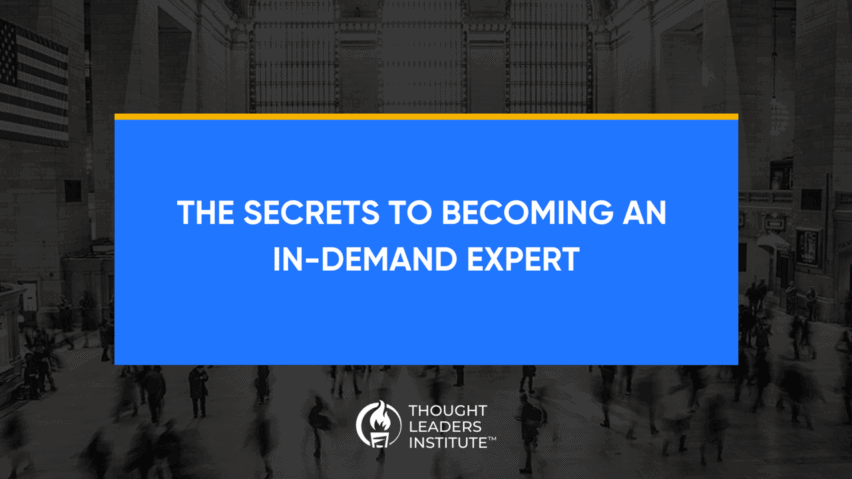You’ve been to their events or seen them on TV – the expert speaker, coach or trainer bringing you the latest and greatest techniques and approaches to growth your business, your wealth, your health or yourself. They seem leagues ahead of where you are – they’re on stage or on TV, after all – and they are making money doing what they love.
Well, let us let you in on a little secret – you can be an expert just like that if you just choose to. It really just comes down to mastering a few things, and we’ll cover these things in this week’s episode.
To watch the full training we mention in this episode, go to https://thoughtleadersinstitute.com/client-attraction
Episode Transcript
Jim Hohl: Welcome to Mastering Growth, Episode Three, Creating Authority: How to Position Yourself as an Expert on Anything. Hi, again. I’m Jim Hohl.
Lucas Garvin: I’m Lucas Garvin. In the past month, we attended two live events: High Performance Academy by Brendon Burchard and Monetize Your Mission by Lisa Sasevich. Of course, as we both expected, the content was amazing, but at this point in our business, what Jim and I get out of events like these is not just the content, but a profound respect and admiration for the skill, the mastery of the experts on those stages.
I know, for me, I used to look at them in awe and wonder and consider them a separate type of being, almost, one I’d probably never be, who stood on this pinnacle of success and spoke with so much authority, literally, almost from on high. But here’s the thing. They aren’t all that different from you or me. Trust me, I mean absolutely no disrespect to Lisa, a good friend and client, nor to Brendon. Nor do I mean to suggest they are not experts. They are absolutely experts in their field and in their subject matter, masters of their craft, and a pleasure to watch and experience in person.
Instead, what I’m suggesting is that, while they are definitely experts, so are we, and so are you. If you don’t see yourself that way yet, I promise that you can be if you choose to be.
Jim Hohl: Let’s just be clear up front, though. We’re not encouraging anyone to pretend to be an expert, to offer bogus information based on nothing but your gut. This podcast and this information is only intended for those who are really expert in what they teach. This episode is also not the Tim Ferriss Become an Expert on Anything approach. We’re huge fans of Tim and his work, but that’s not this. What we’re talking about today is how you can position yourself as an expert, which I think you would agree is way better than positioning yourself as a commodity, right?
Okay, cool. Let’s start off with the obvious first question. Why would you want to be seen as an authority or an expert in your field? Well, the first reason is what I just mentioned, to ensure that you’re not just a commodity. What do I mean by that? Well, commodities are bought and sold based on price and with little regard for the value added by the provider. It’s very hard to charge a premium price in a commodity market. Oil is a commodity. Fertilizer is a commodity. You should not be a commodity.
What we prefer and encourage our clients to do is become a category of one, to position themselves as the only option, rather than one option among many. When you do that, what you can do, in part, by positioning yourself as an expert, you can charge based on value or the potential value you deliver to your clients instead of just matching or beating a competitor’s price, of course within reason, but sometimes you’d be surprised what’s considered reasonable. Also, instead of chasing clients, they will come chasing you. Now, isn’t that a much better place to be in your business?
Lucas Garvin: I definitely think so. How can you go out positioning yourself as an expert? There are three key things you must to do position yourself as an expert. Number one, you help people get clarity. Second, show them a proven system. Third, challenge them to grow and be a good role model.
Let’s start with the first part, helping people get clarity. What do I mean by that? There’s a certain segment of your audience that is seeking clarity on something that you are uniquely qualified to help them with. They may not know what their best next move in this area is. Maybe they don’t even know where to start. You can offer them that clarity. Examples of this include, in marketing, we often help people get clear on their ideal client, exactly who they will serve, or their core offer. If you focus on speaking, you might help them determine a speech topic or figure out where they could speak. If you’re a sales coach, this could be helping your client get clear on the mindset shifts needed to increase their confidence in selling their products and services.
One of our clients helps high-level corporate executives get clear on exactly what they need to shift in their career, personality, behavior, et cetera, to get them ready to be promoted to the C-suite. There are so many examples of this, I’m sure you can quickly identify ways to serve your audience by giving them a little more clarity where it’s needed.
Jim Hohl: The second step in creating authority and positioning yourself as an expert is to show a proven system. People need to know that this has worked before for people like them. I can’t tell you how often I get asked on sales calls, “Great, but do you have any examples of your work for X type of business?” Having a system gives them that confidence that you know what you’re doing, regardless of what business it is.
Having a system also helps people know where they are in the process. In implementing our growth optimization system, for example, there are five phases. When people know that they’re in phase two of five or four of five, it gives them a sense of progress and also a sense of possibility of what’s to come. They know what they’ve accomplished already and what lies ahead to still be achieved. A system is also a great container for how you talk about what you do, and not to mention great IP to distinguish you from your competition.
You can determine your own system from just looking at what you do for every client and breaking it up into steps. Even if you help every client with different problems or challenges, it’s very likely that the system or approach you take them through is the same. That’s where you need to start in figuring out your own unique expert system that you can use with all your clients.
Lucas Garvin: A system like that is just such a powerful way to distinguish yourself. I mean, I know when we first came out with Growth Optimization, it really made all the difference, not in just how we spoke to and invited people to work with us, but even in working with our own clients. It just gave them a sense of clarity and excitement for what the future held that we didn’t have before, so definitely think about that.
The third piece here is you need to challenge your audience to grow, and along the way, you want to be a good role model. When people are looking for a mentor, which as an expert or a thought leader you are to them, they are demonstrating a desire and willingness to grow. If you let them live in their excuses, many of them will. Instead, if you offer them the possibility of a better future and a way to overcome those excuses and circumstances, that’s where the magic happens.
As an expert, you know this for sure. It’s why you got into the business. But when you get caught up in the day to day of running a business, it can be easy to lose sight of this. This is just a gentle reminder of your purpose and mission, to hold your clients to a higher standard, even higher, maybe, than they hold for themselves.
It’s also important to be mindful that you’re a role model to those who follow you. If they see you succeeding and growing, taking action in key areas of your life, they will be more likely to do the same. Simply by doing and being your best, your audience will too, and they’ll revere you even more for it.
Jim Hohl: Absolutely. Now that you’re positioned as an expert, how do you get the word out about that expertise? Well, I’m going to punt a little here and suggest that you check out our next podcast, Episode Four, which is all about creating and growing your list. Your list is one of the key assets that you need to have in place as you grow your expert business. The episode is already available for you, so you can go ahead and listen to it now.
I’m also going to suggest that you check out our new training on this topic, which we call How to Generate High-Ticket Sales on Autopilot. It’s available now at visify.com/newtraining. All those links are going to be available for you in the show notes, so don’t worry about that.
To actually answer the question, there are really only a few ways that work consistently and predictably to get new leads, clients, and revenue in your business: paid advertising, primarily on Facebook, speaking in live events, and content-based email. To really get yourself out there in a meaningful way, you’re going to want to use all three of those approaches in some combination. To do that, you’ll need to develop your skills in those areas as well, as a speaker, as a writer, as an interviewer, interviewee, and possibly as a marketer. But, of course, I think you might have noticed we can probably help you with the marketing part.
If you still don’t see how you can be an expert, well, consider this. Do you know more about something than someone else? Maybe you know how to start a business, how to speak on stage, or how to put on an event. I’m sure you do, so start there. All that people expect is that you are going to be a step ahead of them. That’s enough for you to be an expert in their eyes. As you grow, so will your expertise.
Lucas Garvin: There you have it, how to become an expert in three easy steps. Just kidding. But for sure, though, you are an expert in something. Hopefully, we’ve given you some ideas on how to incorporate that into your business so you can grow and impact even more people.
Before you go, though, be sure to subscribe to the podcast if you haven’t already, and definitely check out our new training at visify.com/newtraining. That training shows you a step-by-step approach to generating high-ticket sales consistently and reliably for your expert coaching or consulting business. Thanks for joining us this week. Until next time, keep growing.

